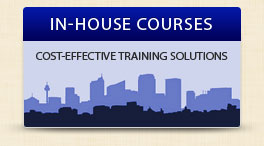 ISO 9001:2015 Internal Quality Auditor Training in the Construction Sector
ISO 9001:2015 Internal Quality Auditor Training in the Construction Sector
Overview
This highly interactive and practical course is designed to develop delegates' skills to apply the ISO 9001 process audit principles within the construction sector and conduct Quality Management System (QMS) audits in order to:
- Develop effective auditing techniques, improve evaluation and identify opportunities for improvement which contribute to an organisation's growth and success
- Objectively assess the compliance of an organisation
- Develop continuous improvement programmes
Course Objectives
Our course will equip delegates with knowledge of the requirements and principles of ISO 9001 relating to the construction sector, providing quality practitioners and systems auditors with the skills necessary to competently perform internal QMS audits.
Key Skills / Learning Objectives
With specific examples within the construction sector and through the combination of interactive tutorials, practical workshops and case studies following the stages in a live audit, our course will enable the delegates to:
- Apply the requirements and principles of ISO 9001 to the specific processes and needs of your company as well as generally within the construction sector.
- Plan and prepare for an internal audit with an understanding of auditing procedures and documentation.
- Measure the application and effectiveness of the 8 Quality Management Principles.
- Conduct an effective QMS audit against ISO 9001 and evaluate the significance of audit findings.
- Present audit findings and assess continual improvement programmes.
Course Outline
Defining the purpose and structure of the ISO 9000 family of Standards and the interrelationship between ISO 9001, TQM and Good Management Practice
- Principles of auditing, the audit cycle and the 8 Quality Management Principles
- Auditing skills and techniques:
- Planning - use of checklists, resources and timing
- Selection of audit teams
- Interviewing and evaluation of information and findings
- Observation - objective evidence
- Evaluating the significance of nonconformities
- Communicating and presenting audit reports
- Corrective actions and effective follow-up programmes
- Effective improvement - planning, monitoring and results
- The evaluation of data collection and analysis systems, including customer satisfaction, goal achievement and process monitoring
- Accreditation and certification
- Sources of information and further development
Who Should Attend?
- Those responsible for undertaking internal audits.
- Managers, whose departments will be subject to these audits, to help them appreciate the benefits that structured audits and the resulting corrective action can bring.
- Senior managers who will have to evaluate the outcome of internal QMS audits and who have responsibility/authority to improve the effectiveness of the QMS.
Booking and Course Fees
Fees include:
- Student Manual, including substantial reference information
- Training provided by qualified and experienced tutors with extensive practical management auditing experience across a variety of manufacture and service industries
- Lunch and refreshments during the day
- Residential accommodation and evening meal (1 night)
- Certificate verifying attendance and completion of course
More Training Information
Training course description in PDF
Request further information
In-House training
Associated courses
What our customers say











